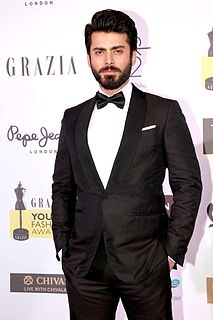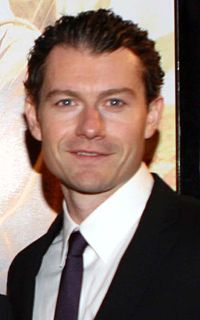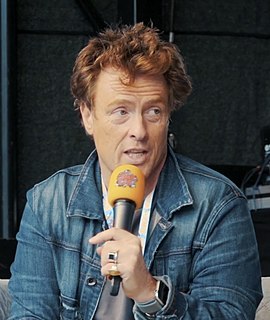A Quote by Virginia Madsen
Our audience is all the girls who made Britney a huge star. Those are the girls who bought the book. I didn't read the book at first. I read the script just to see what I would think of the script and I really liked it.
Related Quotes
I'd say the purest experience for the movie is not to have read the book because I think when you've read the book you're just ticking off boxes. I think that after you see the movie, reading the book is a cool thing. I always say the movie's not meant to replace the book. That's ridiculous. I'm a huge fan of the book.
I think Memento movie was hard because people didn't get it, they just didn't understand it. Not from the stage when we read the script and liked it. It's sort of a famous story now how we finished the movie and showed it to distributors and nobody wanted it. So it wasn't just they didn't get the script, they really didn't even understand the movie when it was done. But I think that was a particularly hard one. I don't think it was harder because we were girls, but I do think obviously there are particular challenges to working in a male-dominated industry.
Yeah I was aware of the book, but hadn't read it. So as soon as I'd finished the script, I got a copy of the book and read that. My wife had read it and she loves it, so that was a good sounding board. I like her writing style, she's such a page-turner. I enjoyed The Constant Princess as well. I think she's great. The books are very popular with women and I can see why.
I read everything. I'll read a John Grisham novel, I'll sit and read a whole book of poems by Maya Angelou, or I'll just read some Mary Oliver - this is a book that was given to me for Christmas. No particular genre. And I read in French, and I read in German, and I read in English. I love to see how other people use language.
As we were negotiating, I didn't have a script. Once the deal is closed, they let you read the script. So, I got the script and was reading it like, "Oh, please be good!," because I'd already signed on the dotted line. And I read it and just went, "Okay, I'm going to be okay. Thank god!" It was a really funny, moving story.
When you start out as an actor, you read a script thinking of it at its best. But that's not usually the case in general, and usually what you have to do is you have to read a script and think of it at its worst. You read it going, "OK, how bad could this be?" first and foremost. You cannot make a good film out of a bad script. You can make a bad film out of a good script, but you can't make a good film out of a bad script.
Directing is a reactionary job more than a creation job. The job is to react whether it's moment one, the first time you read the script or see an article or read a book or notice something happen on the street and have an idea for a movie, and it just continues from there on in. You're just reacting to dialogue, a performance, an audition, a headache, a piece of furniture, a piece of clothing.




































